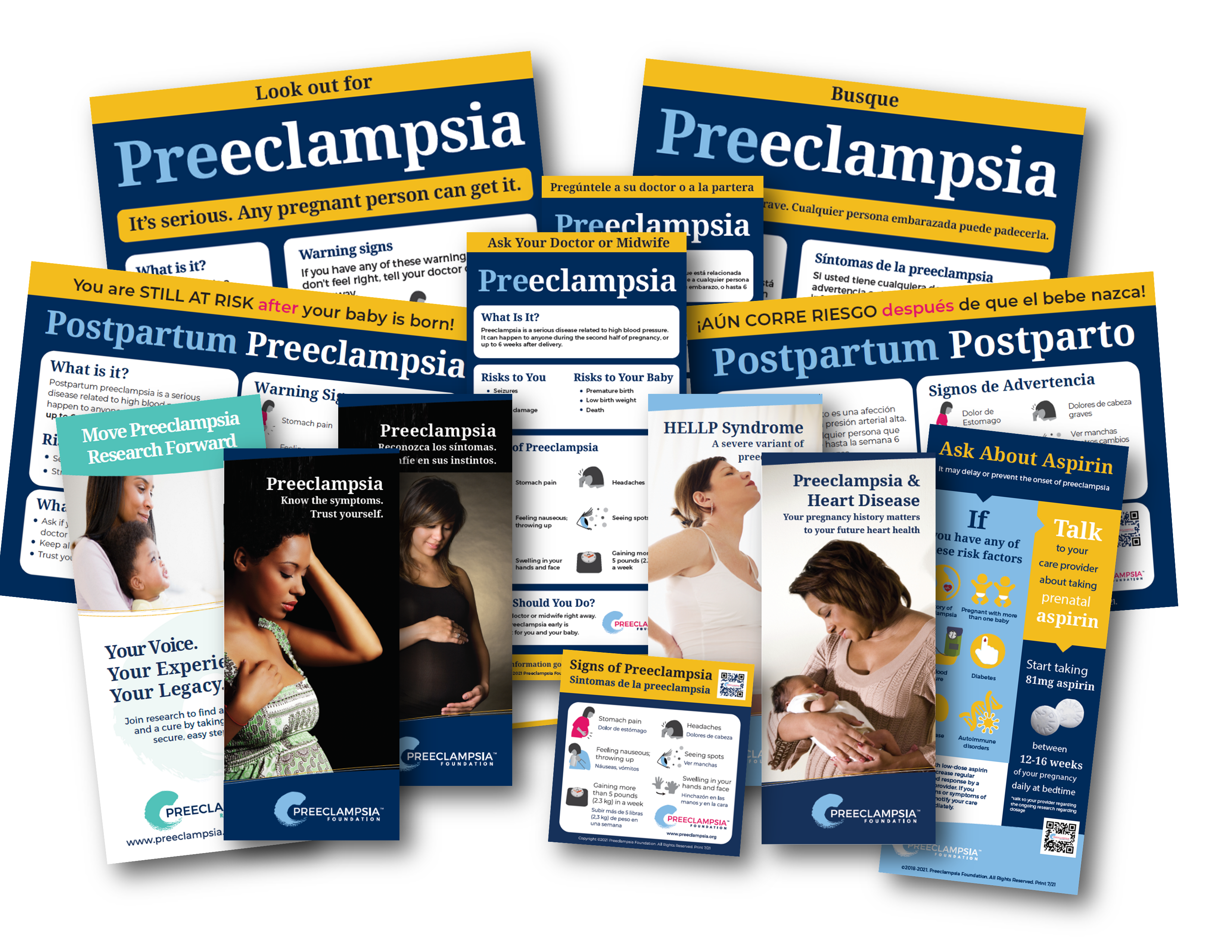
Last Updated on November 22, 2021
Heart disease is the leading cause of death for women and appears to be increasing in women aged 35 to 54 years.
Women who have had preeclampsia have three to four times the risk of high blood pressure and double the risk for heart disease and stroke. They also have an increased risk of developing diabetes. While still unknown whether the risk is caused by preeclampsia or if the woman was already predisposed, these risks first emerge in the years following a complicated pregnancy.
This kind of “heads up” gives you as a healthcare provider an opportunity to educate women on the long term impact of preeclampsia, and to encourage the woman to make changes now for a healthier tomorrow – and reap the benefits today, too!
Download our patient information sheet
WHAT RECOMMENDATIONS ABOUT CARDIOVASCULAR DISEASE DOES THE PREECLAMPSIA FOUNDATION ENDORSE FOR WOMEN WHO EXPERIENCE PREECLAMPSIA?
The Preeclampsia Foundation's position paper on "Preeclampsia and Future Cardiovascular Disease in Women: What Do We Know and What Can We Do"? summarizes current research findings and provides best practice recommendations related to preeclampsia and future cardiovascular disease that are endorsed by the Foundation.
The Preeclampsia Foundation wishes to thank Dr. Mayri Sagady Leslie and Dr. Linda Briggs, George Washington University, School of Nursing, for their extensive research and authorship of this position paper. We also appreciate Dr. Elizabeth Sutton, University of Pittsburgh School of Medicine, Magee-Womens Research Institute, for authoring each “Community Summary” in the position paper. Special thanks to Dr. Tanya Melnik, University of Minnesota, as the primary author of the 2006 position paper this is based upon.
WHAT CAN I DO AS A HEALTHCARE PROFESIONAL TO REDUCE A PATIENT'S RISK FOR HEART DISEASE?
If your patient had preeclampsia, you can encourage them to make lifestyle modifications now to reduce your risk. Also you should consider extra care to monitor the health of your patientt's heart and blood vessels. This may mean more routine visits or even a referal to a cardiologist, in which you would want to include all pregnancy history data, along with health infomration and family history. If your patient has other risk factors in addition to a history of preeclampsia, these steps are even more important. Heart disease takes years to develop and steps can be taken now to reduce risk.
Care guidelines from the American Heart Association and American College of Obstetricians and Gynecologists encourage providers to ask about a woman’s pregnancy history and to consider preeclampsia a risk factor for future heart disease. The American College of Obstetricians and Gynecologists guidelines recommend a yearly assessment to check blood pressure, cholesterol, weight, and blood sugar levels for women with a history of early onset or recurrent preeclampsia. Other pregnancy complications also are associated with increased risk of heart disease. Be sure to ask your patient if:
- She has been pregant before, how many times, and the outcome of each pregnancy?
- She experienced preeclampsia (or high blood pressure) in any of her pregnancies and how many were affected?
- She experienced gestational diabetes in any of her pregnancies, which increases her risk of diabetes later in life?
- Any of her babies were born more than three weeks before their due date?
- Any of her babies weighed less than 5-1/2 pounds at birth?
Recommendations TO LOWER Patient RISK OF HEART DISEASE AND STROKE
GET ADEQUATE PHYSICAL ACTIVITY
Walk 30 minutes five times a week and do muscle-strengthening exercises two or more times a week. Suggest something fun like dance, yoga, or an activity with the whole family to build a habit of movement as a regular part of life.
EAT A HEART-HEALTHY DIET
Eating a diet high in fiber, vegetables, and fruits, and low in fat (the Dietary Approaches to Stop Hypertension – or DASH – eating plan) has been proven to help lower blood pressure. Even if the don’t have high blood pressure, it will help them develop healthy eating habits and may prevent or delay your developing high blood pressure in the future. Proper diet and exercise can reduce risk factors for heart disease.
STAY AT A HEALTHY WEIGHT
A healthy BMI is between 18.5 and 25 (see BMI categories below). A BMI greater than 25 may increase the risk for heart disease. If BMI is high, discuss different ways your patient can lose weight.
IF THEY SMOKE, HELP THEM STOP!
Tobacco raises blood pressure and damages blood vessels immediately. Offer smoking cessation groups or medications to help them kick the habit.
ASK ABOUT THEIR FAMILY HEALTH HISTORY
People with family history of high blood pressure or heart disease, are more likely to get it later in life. Be sure to ask your patient about their family’s health history.
TALK WITH YOUR PATIENT ABOUT ASPIRIN
Taking low-dose aspirin may reduce the risk of heart attack and stroke depending on age and other risk factors. (See reference for aspirin use at uspreventiveservicestaskforce.org.)
EXPLAIN THEIR NUMBERS
Blood pressure: A healthy blood pressure is around 120/80 mm Hg or lower. If their blood pressure is higher, make sure they are aware and talk to them about ways to lower it including lifestyle and diet modifications. Medications may be prescribed for higher blood pressures.
Here's information for patients on how to take blood pressure the right way.Cholesterol: Talk to your patients about tracking cholesterol. If their levels are high, let them know and discuss how to lower them. Diets that include omega 3 fatty acids may help. In some cases, medications such as statins may be important to care.
These are optimal levels:
- Total cholesterol: less than 200 mg/dl
- LDL (bad cholesterol): less than 100 mg/dl
- HDL (good cholesterol): more than 50 mg/dl
- Triglycerides: less than 150 mg/dl
Blood glucose (blood sugar): Discuss screening for diabetes with your patients.
The link between preeclampsia and heart disease is not yet well known among the general population. We encourage women to talk to their doctor about long term impact of preeclampsia. Now you will be able to help answer their questions.
Resources for more information:
American College of Obstetricians and Gynecologists Guidelines
American Heart Association Guidelines
DASH Eating Plan
Million Hearts
Women Heart
Choose My Plate
More about Preeclampsia
Body Mass Index (BMI) Calculator
BMI categories:
Underweight = <18.5
Normal weight = 18.5–24.9
Overweight = 25–29.9
Obesity = BMI of 30 or greater
Related Articles

Nurses play a vital role in detecting preeclampsia and caring for patient before, during, and beyond pregnancy.

A key component needed in the fight against preeclampsia is the development of tests for simple, rapid, and accurate diagnosis and prediction through the development and adoption of biomarkers.

As a first step to address the need for self-monitored blood pressure, the Preeclampsia Foundation started providing the Cuff Kit™ in June 2020 to women at highest risk of developing preeclampsia and...

Every woman should be able to check her own blood pressure at home.

Order our Ask About Aspirin Rack Card. Aspirin can prevent the formation of blood clots. This can make aspirin useful in treating or preventing some conditions like heart attacks and st...

For more on the Preeclampsia Foundation's work to amplify all research related to biomarkers for improved prediction and diagnostic tools, please visit https://preeclampsia.org/biomarkers. INDIANAPOL...

GAP—SPIRIN campaign gets low-dose aspirin to those most at risk to help close the maternal health gap in preeclampsia ________ NEW YORK, January 23, 2025/PRNewswire/ – In recognition of...
1732072344.png)
While the Preeclampsia Foundation has been championing patient advocacy and representation for all families affected by hypertension in pregnancy throughout our 25 year history, we recognized the uniq...

Washington, DC – April 11, 2024 – On April 10, one day before the start of Black Maternal Health Week, the Preeclampsia Foundation in partnership with Thermo Fisher Diagnostics held a Hill...

Recently, I came across a social media post calling attention to the global maternal health crisis from a Black woman’s perspective. Someone responded to the post asking, “What’s rac...


